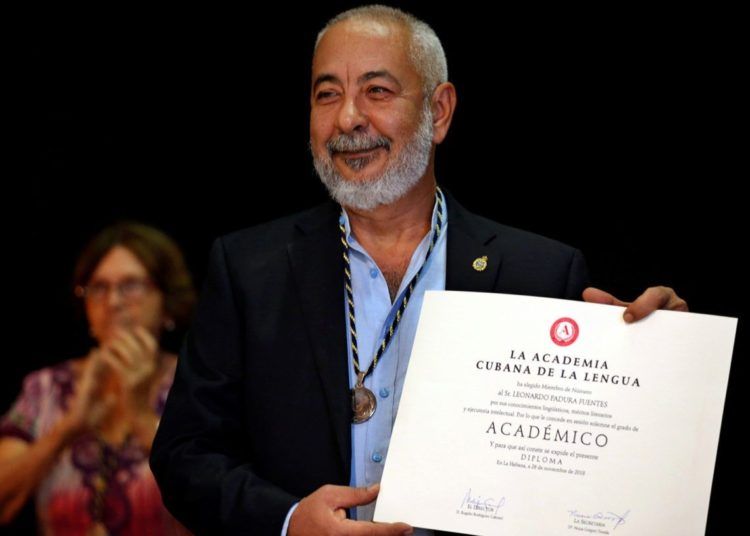Writer Leonardo Padura, considered Cuba’s author with the greatest international projection, this November 26 was named a member of the Cuban Academy of the Language, where he expects to contribute his personal way of understanding literature while he prepares his new novel.
“I’m working with a way of understanding the language that has to do with the street, with life, with evolution, the revolution that language represents,” Padura (Havana, 1955) said in an interview with the EFE agency after the official ceremony to enter the Academy, where he will occupy seat U.
The writer, father of detective Mario Conde who is the main character of his detective novels and the author of the famous El hombre que amaba a los perros, recognized that what differentiates him from the other members of the Academy is “not being an academician,” which is why he promised to contribute in that institution his “work as a writer.”
He will combine it with the preparation of his next novel, of which he gave some previews: it will be called El clan disperso, the title of an unconcluded manuscript by Alejo Carpentier, and it will deal with “the Cuban dispersion, that of my generation,” that is, the extensive diaspora of Cubans throughout the world.
“You’ll have it when I finish it,” he answered after being asked about the approximate date in which the book will be published.
Awarded in Cuba the 2012 National Prize for Literature and in Spain the 2015 Princess of Asturias Prize for Literature – he also received last October in Barcelona the Barcino International Prize for Historic Novel -, Padura affirms that his next goal as a novelist is none other than achieving that his next book “be better than the previous one.”
Before receiving a medal, the dictionary of the Academy and a diploma that certifies his entry, the Cuban writer read for those attending the ceremony his until now unpublished essay “¿Para qué se escribe una novela?”, where he reflects on the relationship between authors, their works and the historic times in which they lived.
The essay is not exempt of veiled criticisms of governments like that of the former Soviet Union and which also appear in some of his novels, in which he frequently has also tried to prove the difficulties of the Cuban system established after the 1959 Revolution and greatly inspired on the Moscow of that time.
His usual criticisms are considered one of the causes why, despite his international success, Padura has not been glorified and barely received recognitions before this decade in his own country, where it is known he maintains distant relations with the authorities and his works are published in print runs that don’t cover the demand.
“It’s the same as always, nothing has changed,” he answered laughing, after being asked about the current state of his relations with the Cuban government.
It is surprising that the writer entered the Cuban Academy of the Language after having done so in that of Puerto Rico, Costa Rica and Panama, of which he is an honorary member.
“In all case I feel very proud and honored” by the appointment, said Padura, also the author of other outstanding literary works like La novela de mi vida, Herejes, as well as his most recent La transparencia del tiempo.
The Cuban Academy of the Language had approved his entering in a plenary session last April, together with those of researcher and essayist Cira Redondo and narrator and playwright Reinaldo Montero, but his entry only became official this Monday, with the public reading of his speech.










Savеd as a favorite, I love your site!